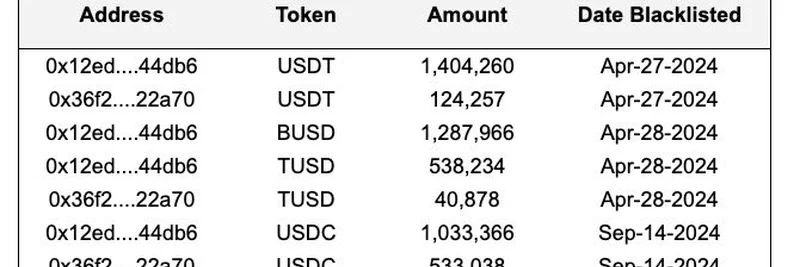In the ever-evolving world of cryptocurrency, staying ahead of bad actors is crucial. Recently, renowned on-chain investigator ZachXBT shared an exciting update on X (formerly Twitter) about efforts to combat money laundering in the crypto space. All four major stablecoin issuers—Paxos, Tether, Techteryx, and Circle—have now blacklisted two Ethereum addresses tied to the infamous Lazarus Group, effectively freezing $4.96 million in funds.
For those new to the term, stablecoins are cryptocurrencies designed to maintain a stable value, often pegged to the US dollar. They're like the steady anchors in the volatile sea of crypto. The Lazarus Group, on the other hand, is a state-sponsored hacking collective from North Korea, known for high-profile cyber attacks and laundering stolen funds through various blockchain networks.
ZachXBT's update builds on his in-depth investigation from earlier this year, where he traced how the Lazarus Group laundered over $200 million from more than 25 crypto hacks between 2020 and 2023. You can dive into the full details in his comprehensive report here.
The blacklisted addresses are:
- 0x36f2D3871edd59d5C06DB8F0b12bE928d5922A70
- 0x12ED7f6ed0491678764c2b222A58452926E44DB6
These addresses held various stablecoins like USDT (Tether), BUSD (Binance USD, issued by Paxos), TUSD (TrueUSD, issued by Techteryx), and USDC (Circle). By blacklisting them, the issuers prevent these funds from being transferred or redeemed, essentially locking them away from the hackers.
In addition to the $4.96 million in blacklisted stablecoins, another $1.65 million has been frozen at various exchanges. This brings the total amount recovered or frozen from ZachXBT's investigation to an impressive $6.98 million. It's a win for the crypto community, showing how collaboration between investigators, issuers, and authorities can disrupt illicit activities.
Here's a breakdown of the blacklisted amounts as shared by ZachXBT:
| Address | Token | Amount | Date Blacklisted |
|---|---|---|---|
| 0x12ed...44db6 | USDT | 1,404,260 | Apr-27-2024 |
| 0x36f2...22a70 | USDT | 124,257 | Apr-27-2024 |
| 0x12ed...44db6 | BUSD | 1,287,966 | Apr-28-2024 |
| 0x12ed...44db6 | TUSD | 538,234 | Apr-28-2024 |
| 0x36f2...22a70 | TUSD | 40,878 | Apr-28-2024 |
| 0x12ed...44db6 | USDC | 1,033,366 | Sep-14-2024 |
| 0x36f2...22a70 | USDC | 533,038 | Sep-14-2024 |
This table highlights the progressive blacklisting, with Circle being the last to act on USDC holdings in September 2024.
What does this mean for meme token enthusiasts and blockchain practitioners? Well, incidents like these underscore the importance of security in the crypto ecosystem. Meme tokens, often built on platforms like Ethereum or Solana, can be vulnerable to similar exploits if not properly audited. It's a reminder to always DYOR (do your own research) and support projects that prioritize transparency and compliance.
ZachXBT's work continues to shine a light on these shadowy operations, helping to make the blockchain a safer place. If you're interested in following more updates, check out his original post on X here.
As the crypto world grows, so do the efforts to protect it. Stay informed, stay secure, and keep building!


